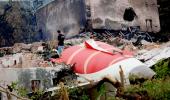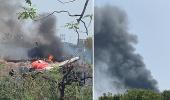'Other than blaming the pilot, there is zero accountability.'

The shocking and gruesome crash of the Air India Dreamliner flight to London from Ahmedabad last Thursday, June 12, 2025, resulted in the death of more than 270 lives.
"There is total lack of accountability and no moral responsibility," Captain A Mohan Ranganathan, a former airline instructor pilot and aviation safety advisor, tells Rediff's Shobha Warrier.
Almost every day, we hear about one Air India flight or the other experiencing technical problems and flights coming back, delaying, etc.
Do you feel even after the Tata group taking over also, nothing has changed in the functioning of the airline?
Even after the Tata takeover, they could not make any changes in the first two years. So, the government had remote control then.
Unfortunately, even after the Tatas got into the independent mode, nothing has changed. They brought in all these expats to the top posts, but they are really not enforcing rules.
There are a lot of bad apples running the system, and the same set of people who were there earlier are still continuing. And they are all masters in cover ups and fudging.
I can say that with authority as I know what kind of fudging was done for the Mangalore crash of the Air India Express and again for the Calicut crash.
There is total lack of accountability and no moral responsibility.
Earlier, ministers like Karan Singh and Lal Bahadur Shastri resigned as ministers taking moral responsibility for an airline crash and a train accident. Do you see anything of that sort now?
Even after many train accidents, we see the same man continuing as the minister.

If you were to list the probable causes of the Air India crash, what will they be?
First, I would look the aerodrome standards taking into account the presence of obstacles, birds, and maintenance of the aerodrome. Was it 100%?
Second will be the crew action especially looking at a very vital thing like the landing gear. Looking at how engine failure was handled, I would say human failure because of the stress and startle effect.
Third will be the regulatory function. The primary objective of the accident investigation is to to find out the cause.
If you go back to all the accidents in the last 25 years, you will see the same type of violations, and the same type of accidents happening again and again.
Then, reports are not transparent. We don't see any procedure to prevent a recurrence.
Yet, other than blaming the pilot, there is zero accountability. Blaming the pilot won't solve the problem.
The last in the list is the passengers. Worldwide, if an airline has a history of breaking safety records, people tend to avoid the airline.
But in India, what do people look for?
A few years back, the consumer association of India did a survey in which they asked air passengers what their number priority is. The options were safety, comforts, facilities, and the cost of the ticket.
85% responded that they would look at the cost of the ticket first. What does it show? That passengers themselves don't care about safety.
Feature Presentation: Aslam Hunani/Rediff










